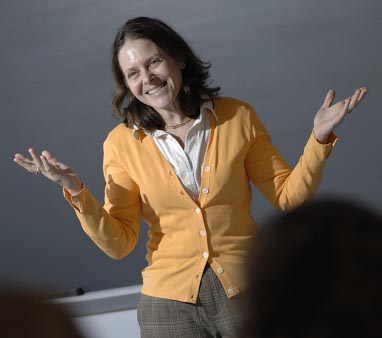Framing Choice
September 21, 2010 - "The whole idea of choice is highly politicized in this country," explains GSE professor Sigal Ben-Porath. Witness the raging political and popular debates between those who advocate minimal government intervention and regulation, and those who believe that the government should provide a more expansive support and a safety network to citizens.
Trying to determine the extent to which the government should be permitted to intervene in personal choices, Ben-Porath makes a case for "structured paternalism," or the deliberate framing of choices by government.
 In her latest book, Tough Choices: Structured Paternalism and the Landscape of Choice, she examines the ways in which we conceive of both choice and opportunity. Historically, an individual’s choices have been limited, and so "at first glance, choice does seem like an appropriate, straightforward solution to the shortcomings of the alternative, choice-less vision of the predestined life."
In her latest book, Tough Choices: Structured Paternalism and the Landscape of Choice, she examines the ways in which we conceive of both choice and opportunity. Historically, an individual’s choices have been limited, and so "at first glance, choice does seem like an appropriate, straightforward solution to the shortcomings of the alternative, choice-less vision of the predestined life."
For one thing, choices are constrained by opportunity. If, for example, you don’t have the opportunity to prepare for a medical career, it’s not right to claim that you’ve chosen not to be a doctor. Similarly, choice is shaped by context: ”The fact that I am a woman, or that I am Caucasian, or that I am an immigrant..., all of these have a significant impact on the kind of preferences that I will have and the kinds of opportunities that I will have."
As a philosopher of education, Ben-Porath applies these ideas to her discussion of school choice.
How, she asks, can we structure a system that will promote the greatest possible freedom of choice and the greatest possible equality of opportunity?
To select the best school for their child, parents need to have a wide array of resources at their disposal: the time to attend open school nights, the capacity to read and understand brochures, and so on. For many parents, opportunity and context—enough time or money, facility with the language—constrain the choices they are able to make on behalf of their children.
But the current system proceeds from the assumption of a level playing field. It presupposes that all parents share the same opportunities and contexts.
The "landscape of choice" is largely controlled by the state’s legislative and regulatory systems—including decisions not to regulate, or not to take action. The structured paternalism that Ben-Porath advocates in Tough Choices is based on the understanding that, because state intervention is often inevitable, theorists and policymakers should focus on the extent to which it can productively be applied.
As one example, Ben-Porath describes what happens when drivers are, or are not, assumed to be organ donors when applying for licenses. In general, those with strong convictions will follow their own opinions, while those with less interest in the question will choose the path of least resistance. The government can thus increase the number of people who are registered as organ donors by changing the default status of a driver from "non-donor" to "donor." No one’s freedom is impinged upon by this change; however, the structuring of this choice speaks about the priorities of the government and society.
When it comes to school choice, Ben-Porath suggests a similar structure. "Choice policies need to avoid defaults," she writes, which effectively consign the children most in need to the weakest schools. Instead, policy should be written so that all parents must choose a school for their child—and that all get the information and support they need to make the wisest choice.
Deliberately—and carefully—structuring this and other choices, Ben-Porath concludes, can increase equality of opportunity without restricting freedom of choice.
For a video of Sigal Ben-Porath talking about her work, click here.
